- Home
- Tahereh Mafi
An Emotion of Great Delight
An Emotion of Great Delight Read online
Contents
Cover
Title Page
December 2003
One
Two
Last Year: Part I
December 2003
Three
Four
Five
Last Year: Part II
December 2003
Six
Seven
Eight
Nine
Last Year: Part III
December 2003
Ten
Eleven
Twelve
Thirteen
Fourteen
Fifteen
Sixteen
Last Year: Part IV
December 2003
Seventeen
Eighteen
Nineteen
Twenty
Twenty-One
Twenty-Two
Twenty-Three
About the Author
Books by Tahereh Mafi
Back Ads
Copyright
About the Publisher
December
2003
One
The sunlight was heavy today, fingers of heat forming sweaty hands that braced my face, dared me to flinch. I was stone, still as I stared up into the eye of an unblinking sun, hoping to be blinded. I loved it, loved the blistering heat, loved the way it seared my lips.
It felt good to be touched.
It was a perfect summer day out of place in the fall, the stagnant heat disturbed only by a brief, fragrant breeze I couldn’t source. A dog barked; I pitied it. Airplanes droned overhead, and I envied them. Cars rushed by and I heard only their engines, filthy metal bodies leaving their excrement behind and yet—
Deep, I took a deep breath and held it, the smell of diesel in my lungs, on my tongue. It tasted like memory, of movement. Of a promise to go somewhere, I released the breath, anywhere.
I, I was going nowhere.
There was nothing to smile about and still I smiled, the tremble in my lips an almost certain indication of oncoming hysteria. I was comfortably blind now, the sun having burned so deeply into my retinas that I saw little more than glowing orbs, shimmering darkness. I laid backward on dusty asphalt, so hot it stuck to my skin.
I pictured my father again.
His gleaming head, two tufts of dark hair perched atop his ears like poorly placed headphones. His reassuring smile that everything would be fine. The dizzying glare of fluorescent lights.
My father was nearly dead again, but all I could think about was how if he died I didn’t know how long I’d have to spend pretending to be sad about it. Or worse, so much worse: how if he died I might not have to pretend to be sad about it. I swallowed back a sudden, unwelcome knot of emotion in my throat. I felt the telltale burn of tears and squeezed my eyes shut, willing myself to get up. Stand up.
Walk.
When I opened my eyes again a ten-thousand-foot-tall police officer was looming over me. Babble on his walkie-talkie. Heavy boots, a metallic swish of something as he adjusted his weight.
I blinked and backed up, crab-like, and evolved from legless snake to upright human, startled and confused.
“This yours?” he said, holding up a dingy, pale blue backpack.
“Yes,” I said, reaching for it. “Yeah.”
He dropped the bag as I touched it, and the weight of it nearly toppled me forward. I’d ditched the bloated carcass for a reason. Among other things, it contained four massive textbooks, three binders, three notebooks, and two worn paperbacks I still had to read for English. The after-school pickup was near a patch of grass I too-optimistically frequented, too often hoping someone in my family would remember I existed and spare me the walk home. Today, no such luck. I’d abandoned the bag and the grass for the empty parking lot.
Static on the walkie-talkie. More voices, garbled.
I looked up.
Up, up a cloven chin and thin lips, nose and sparse lashes, flashes of bright blue eyes. The officer wore a hat. I could not see his hair.
“Got a call,” he said, still peering at me. “You go to school here?” A crow swooped low and cawed, minding my business.
“Yeah,” I said. My heart had begun to race. “Yes.”
He tilted his head at me. “What were you doing on the ground?”
“What?”
“Were you praying or something?”
My racing heart began to slow. Sink. I was not devoid of a brain, two eyes, the ability to read the news, a room, this man stripping my face for parts. I knew anger, but fear and I were better acquainted.
“No,” I said quietly. “I was just lying in the sun.”
The officer didn’t seem to buy this. His eyes traveled over my face again, at the scarf I wore around my head. “Aren’t you hot in that thing?”
“Right now, yes.”
He almost smiled. Instead he turned away, scanned the empty parking lot. “Where are your parents?”
“I don’t know.”
A single eyebrow went up.
“They forget about me,” I said.
Both eyebrows. “They forget about you?”
“I always hope someone will show up,” I explained. “If not, I walk home.”
The officer looked at me for a long time. Finally, he sighed.
“All right.” He backhanded the sky. “All right, get going. But don’t do this again,” he said sharply. “This is public property. Do your prayers at home.”
I was shaking my head. “I wasn’t—” I tried to say. I wasn’t, I wanted to scream. I wasn’t.
But he was already walking away.
Two
It took a full three minutes for the fire in my bones to die out.
In the increasing quiet, I looked up. The once-white clouds had grown fat and gray; the gentle breeze was now a chilling gust. The drunk December day had sobered with a suddenness that bordered on extreme and I frowned at the scene, at its burnt edges, at the crow still circling above my head, its caw caw a constant refrain. Thunder roared, suddenly, in the distance.
The officer was mostly memory now.
What was left of him was marching off into the fading light, his boots heavy, his gait uneven; I watched him smile as he murmured into his radio. Lightning tore the sky in two and I shivered, jerkily, as if electrocuted.
I did not have an umbrella.
I reached under my shirt and tugged free the folded newspaper from where I’d stashed it in my waistband, flush against my torso, and tucked it under my arm. The air was heavy with the promise of a storm, the wind shuddering through the trees. I didn’t really think a newspaper would hold up against the rain, but it was all I had.
These days, it was what I always had.
There was a newspaper vending machine around the corner from my house, and a few months ago, on a whim, I’d purchased a copy of the New York Times. I’d been curious about Adults Reading the Newspaper, curious about the articles therein that sparked the conversations that seemed to be shaping my life, my identity, the bombing of my friends’ families in the Middle East. After two years of panic and mourning post-9/11, our country had decided on aggressive political action: we had declared war on Iraq.
The coverage was relentless.
The television offered a glaring, violent dissemination of information on the subject, the kind I could seldom stomach. But the slow, quiet business of reading a newspaper suited me. Even better, it filled the holes in my free time.
I’d started shoving quarters in my pocket every day, purchasing copies of the newspaper on my way to school. I perused the articles as I walked the single mile, the exercise of mind and body elevating my blood pressure to dangerous heights. By the time I reached first perio
d I’d lost both my appetite and my focus. I was growing sick on the news, sick of it, heedlessly gorging myself on the pain, searching in vain for an antidote in the poison. Even now my thumb moved slowly over the worn ink of old stories, back and forth, caressing my addiction.
I stared up at the sky.
The lone crow overhead would not cease its staring, the weight of its presence seeming to depress the air from my lungs. I forced myself to move, to shutter the windows in my mind as I went. Silence was too welcoming of unwanted thoughts; I listened instead to the sounds of passing cars, to the wind sharpening against their metal bodies. There were two people in particular I did not want to think about. Neither did I want to think about looming college applications, the police officer, or the newspaper still clenched in my fist, and yet—
I stopped, unfurled the paper, smoothed its corners.
Afghan Villagers Torn by Grief After US Raid Kills 9 Children
My phone rang.
I retrieved it from my pocket, going still as I scanned the flashing number on the screen. A blade of feeling impaled me—and then, just as suddenly, withdrew. Different number. Heady relief nearly prompted me to laugh, the sensation held at bay only by the dull ache in my chest. It felt as if actual steel had been buried between my lungs.
I flipped open the phone.
“Hello?”
Silence.
A voice finally broke through, a mere half word emerging from a mess of static. I glanced at the screen, at my dying battery, my single bar of reception. When I flipped the phone shut, a prickle of fear moved down my spine.
I thought of my mother.
My mother, my optimistic mother who thought that if she locked herself in her closet I wouldn’t hear her sobs.
A single, fat drop of water landed on my head.
I looked up.
I thought of my father, six feet of dying man swaddled in a hospital bed, staring into the middle distance. I thought of my sister.
A second drop of rain fell in my eye.
The sky ruptured with a sudden crack and in the intervening second—in the heartbeat before the deluge—I contemplated stillness. I considered lying down in the middle of the road, lying there forever.
But then, rain.
It arrived in a hurry, battering my face, blackening my clothes, pooling in the folds of my backpack. The newspaper I lifted over my head endured all of four seconds before succumbing to the wet, and I hastily tucked it away, this time in my bag. I squinted into the downpour, readjusted the demon on my back, and pulled my thin jacket more tightly around my body.
Walked.
Last Year
Part I
Two sharp knocks at my door and I groaned, pulled the blanket over my head. I’d been up late last night memorizing equations for my physics class, and I’d gotten maybe four hours of sleep as a result. The very idea of getting out of bed made me want to weep.
Another hard knock.
“It’s too early,” I said, my voice muffled by the blanket. “Go away.”
“Pasho,” I heard my mother say. Get up.
“Nemikham,” I called back. I don’t want to.
“Pasho.”
“Actually, I don’t think I can go to school today. I think I have tuberculosis.”
I heard the soft shh of the door pushing open against carpet, and I curled away instinctively, a nautilus in its shell. I made a pitiful sound as I waited for what seemed inevitable—for my mother to drag me, bodily, out of bed, or, at the very least, to rip off the covers.
Instead, she sat on me.
I nearly screamed at the unexpected weight. It was excruciating to be sat upon while curled in the fetal position; somehow my stacked bones made me more vulnerable to damage. I thrashed around, shouted at her to get off me, and she just laughed, pinched my leg.
I cried out.
“Goftam pasho.” I said get up.
“How am I supposed to get up now?” I asked, batting away the sheets from my face. “You’ve broken all my bones.”
“Eh?” She raised her eyebrows. “You say that to me? Your mother”—she said all this in Farsi—“is so heavy she could break all your bones? Is that what you’re saying?”
“Yes.”
She gasped, her eyes wide. “Ay, bacheyeh bad.” Oh, you bad child. And with a slight bounce, she sat more heavily on my thighs.
I let out a strangled cry. “Okay okay I’ll get up I’ll get up oh my God—”
“Maman? Are you up here?”
At the sound of my sister’s voice, my mom got to her feet. She whipped the covers off my bed and said, “In here!” Then, to me, with narrowed eyes: “Pasho.”
“I’m pasho-ing, I’m pasho-ing,” I grumbled.
I got to my feet and glanced, out of habit, at the alarm clock I’d already silenced a half dozen times, and nearly had a stroke when I saw the hour. “I’m going to be late!”
“Man keh behet goftam,” my mom said with a shrug. I told you.
“You told me nothing.” I turned, eyes wide. “You never told me what time it was.”
“I did tell you. Maybe your tuberculosis made you deaf.”
“Wow.” I shook my head as I stalked past her. “Hilarious.”
“I know, I know, I’m heelareeus,” she said with a flourish of her hand. She switched back to Farsi. “By the way, I can’t take you to school today. I have a dentist appointment. Shayda is taking you instead.”
“No I’m not,” my sister called, her voice growing louder as she approached. She popped her head inside my room. “I have to leave right now, and Shadi isn’t even dressed.”
“No— Wait—” I startled scrambling. “I can be dressed in five minutes—”
“No you can’t.”
“Yes I can!” I was already across the hall in our shared bathroom, applying toothpaste to my toothbrush like a crazy person. “Just wait, okay, just—”
“No way. I’m not going to be late because of you.”
“Shayda, what the hell—”
“You can walk.”
“It’ll take me forty-five minutes!”
“Then ask Mehdi.”
“Mehdi is still asleep!”
“Did someone say my name?”
I heard my brother coming up the stairs, his words a little rounder than usual, like maybe he was eating something as he spoke. My heart gave a sudden leap.
I spat toothpaste into the sink, ran into the hall. “I need a ride to school,” I cried, toothbrush still clenched in my fist. “Can you take me?”
“Never mind. I’ve gone suddenly deaf.” He barreled back down the stairs.
“Oh my God. What is wrong with everyone in this family?”
My dad’s voice boomed upward. “Man raftam! Khodafez!” I’m leaving! Bye!
“Khodafez!” the four of us shouted in unison.
I heard the front door slam shut as I flew to the banister, caught sight of Mehdi on the landing below.
“Wait,” I said, “please, please—”
Mehdi looked up at me and smiled his signature, devastating smile, the kind I knew had already ruined a few lives. His hazel eyes glittered in the early-morning light. “Sorry,” he said. “I’ve got plans.”
“How do you have plans at seven thirty in the morning?”
“Sorry,” he said again, his lean form disappearing from view. “Busy day.”
My mom patted me on the shoulder. “Mikhasti zoodtar pashi.” You could’ve woken up earlier.
“An excellent point,” Shayda said, swinging her backpack over one shoulder. “Bye.”
“No!” I ran back into the bathroom, rinsed my mouth, splashed water on my face. “I’m almost ready! Two more minutes!”
“Shadi, you’re not even wearing pants.”
“What?” I looked down. I was wearing an oversize T-shirt. No pants. “Wait— Shayda—”
But she was already moving down the stairs.
“Manam bayad beram,” my mom said. I have to go, too. She sho
t me a sympathetic glance. “I’ll pick you up after school, okay?”
I acknowledged this with a distracted goodbye and darted back into my room. I changed into jeans and a thermal at breakneck speed, nearly stumbling over myself as I grabbed socks, a hair tie, my scarf, and my half-zipped backpack. I flew downstairs like a maniac, screaming Shayda’s name.
“Wait,” I cried. “Wait, I’m ready! Thirty seconds!”
I hopped on one foot as I pulled on my socks, slipped on my shoes. I tied back my hair, knotted my scarf à la Jackie O—or, you know, a lot of Persian ladies—and bolted out the door. Shayda was at the curb, unlocking her car, and my mom was settling into her minivan, still parked in the driveway. I waved at her, breathless as I shouted—
“I made it!”
My mom smiled and flashed me a thumbs-up, both of which I promptly reciprocated. I then turned the wattage of my smile on Shayda, who only rolled her eyes and, with a heavy sigh, granted me passage in her ancient Toyota Camry.
I was euphoric.
I waved another goodbye at my mom—who’d just turned on her car—before depositing my unwieldy bag in Shayda’s back seat. My sister was still buckling herself into the driver’s side, arranging her things, placing her coffee mug in the cup holder, et cetera, and I leaned against the passenger side door, taking advantage of the moment to both catch my breath and enjoy my victory.
Too late, I realized I was freezing.
It was the end of September, the beginning of fall, and I hadn’t yet adjusted to the new season. The weather was inconsistent, the days plagued by both hot and cold stretches, and I wasn’t sure it was worth risking Shayda’s wrath to run upstairs and grab my jacket.
My sister seemed to read my mind.
“Hey,” she barked at me from inside the car. “Don’t even think about it. If you go back in the house, I’m leaving.”
My mom, who was also a mind reader, suddenly hit the brakes on her minivan, rolled down the window.
“Bea,” she called. Here. “Catch.”
I held out my hands as she tossed a balled-up sweatshirt in my direction. I caught it, assessed it, held it up to the sky. It was a standard-issue black hoodie, the kind you pulled over your head. Its only distinguishing features were the drawstrings, which were a vibrant blue.

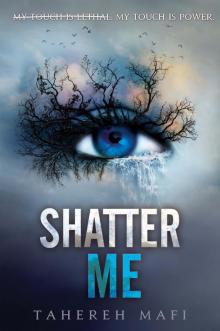 Shatter Me
Shatter Me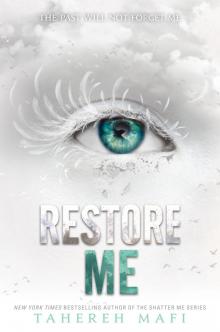 Restore Me
Restore Me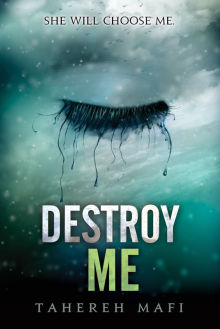 Destroy Me
Destroy Me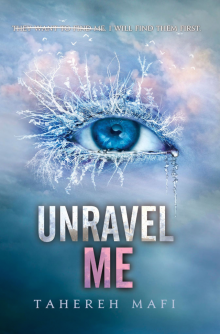 Unravel Me
Unravel Me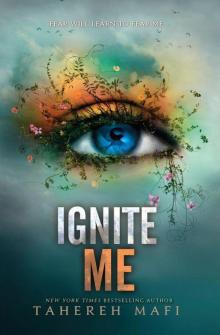 Ignite Me
Ignite Me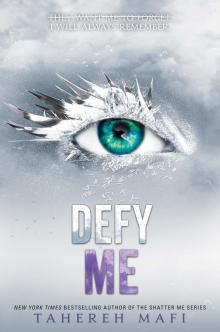 Defy Me
Defy Me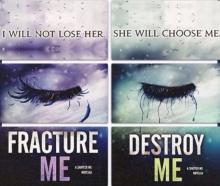 Fracture Me
Fracture Me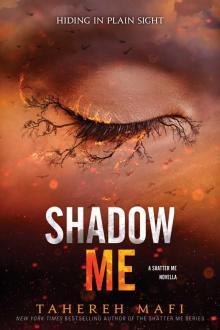 Shadow Me
Shadow Me Whichwood
Whichwood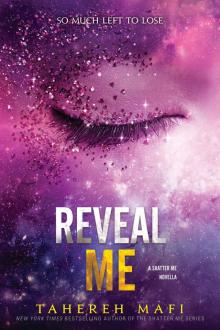 Reveal Me
Reveal Me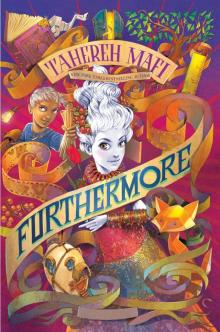 Furthermore
Furthermore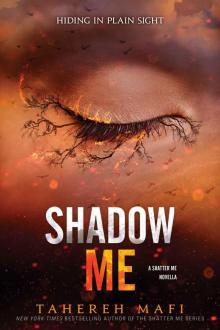 Shadow Me (Shatter Me Novella)
Shadow Me (Shatter Me Novella)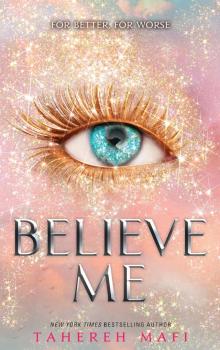 Believe Me
Believe Me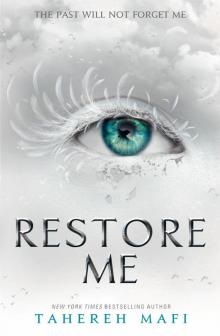 Restore Me (Shatter Me)
Restore Me (Shatter Me)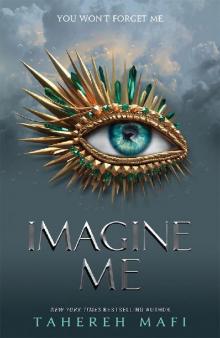 Imagine Me
Imagine Me An Emotion of Great Delight
An Emotion of Great Delight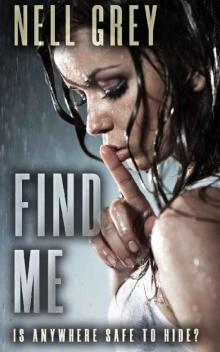 Find Me
Find Me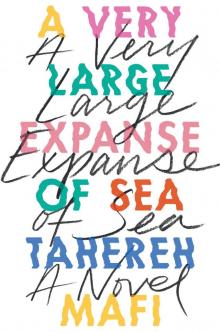 A Very Large Expanse of Sea
A Very Large Expanse of Sea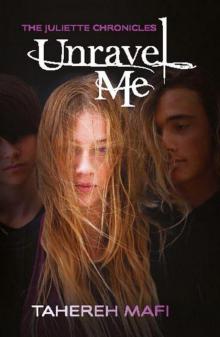 Unravel Me: The Juliette Chronicles Book 2
Unravel Me: The Juliette Chronicles Book 2